2022年牛津译林版中考英语语法系列课件(13)—情态动词20张
文档属性
| 名称 | 2022年牛津译林版中考英语语法系列课件(13)—情态动词20张 |  | |
| 格式 | pptx | ||
| 文件大小 | 102.6KB | ||
| 资源类型 | 教案 | ||
| 版本资源 | 通用版 | ||
| 科目 | 英语 | ||
| 更新时间 | 2021-12-26 11:24:44 | ||
图片预览

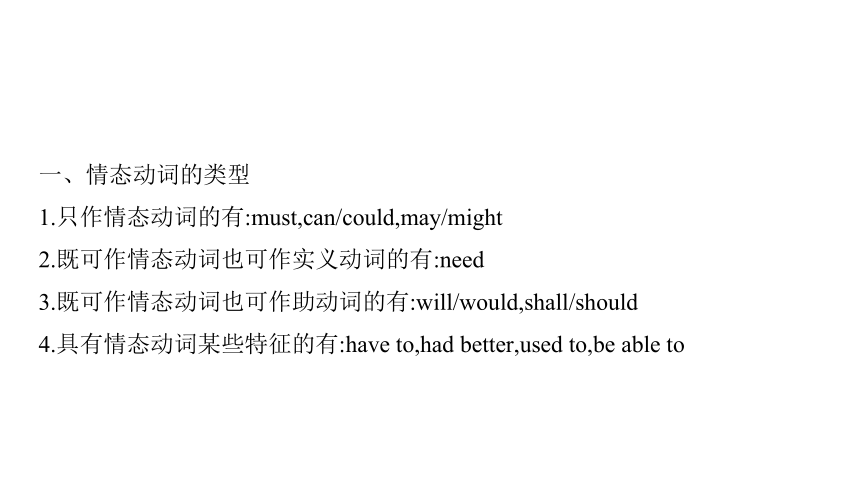

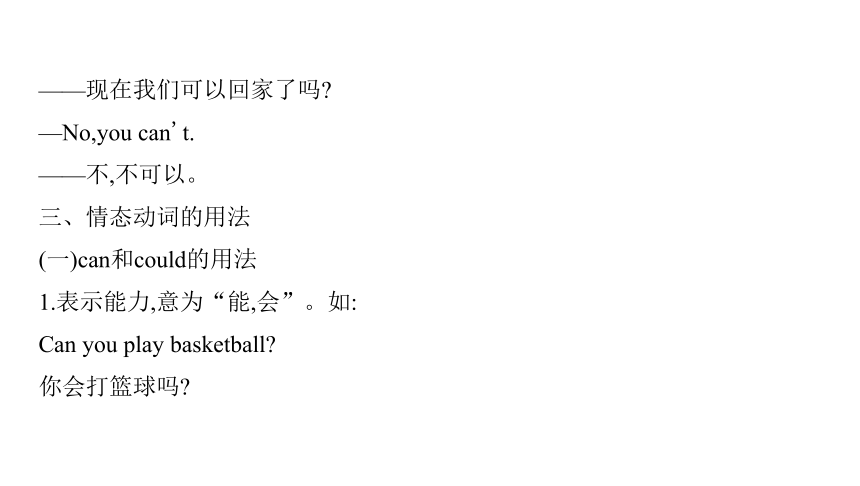
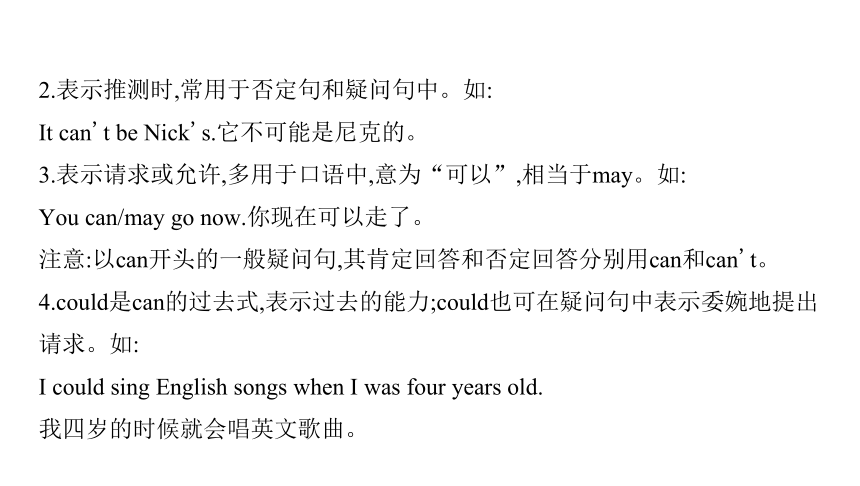
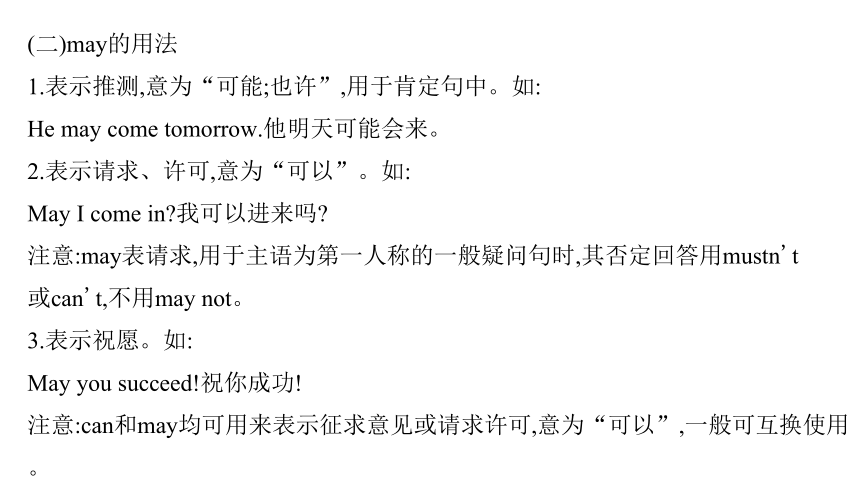
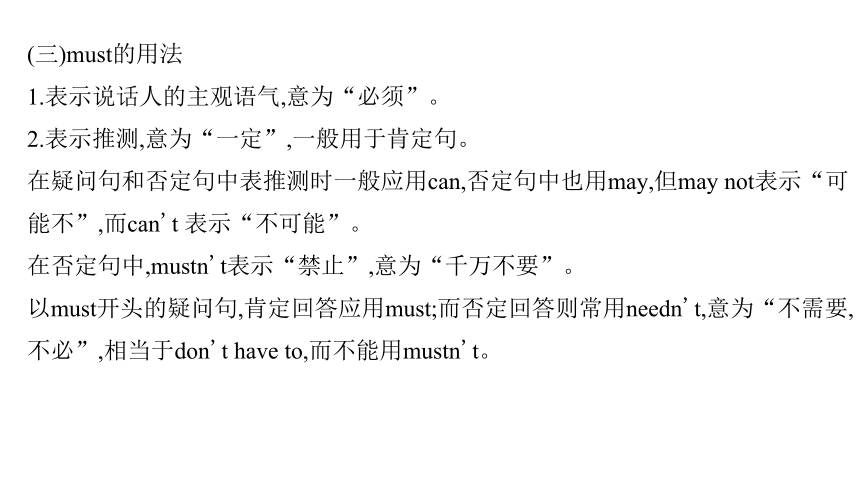
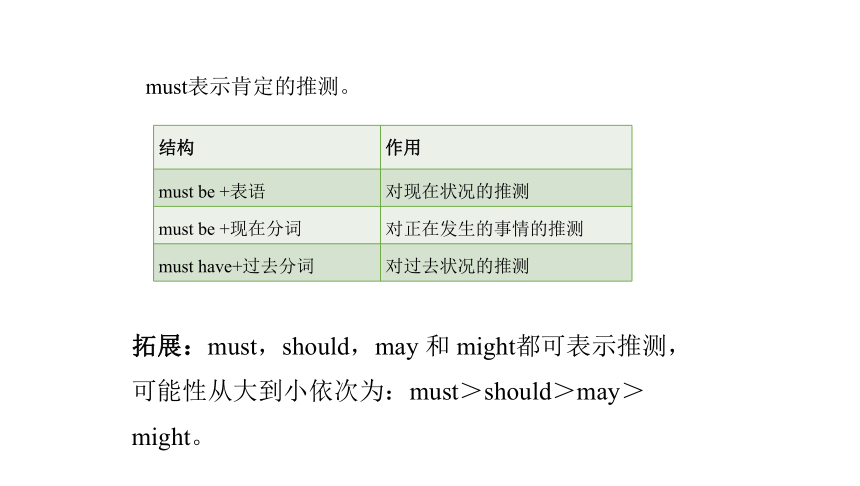
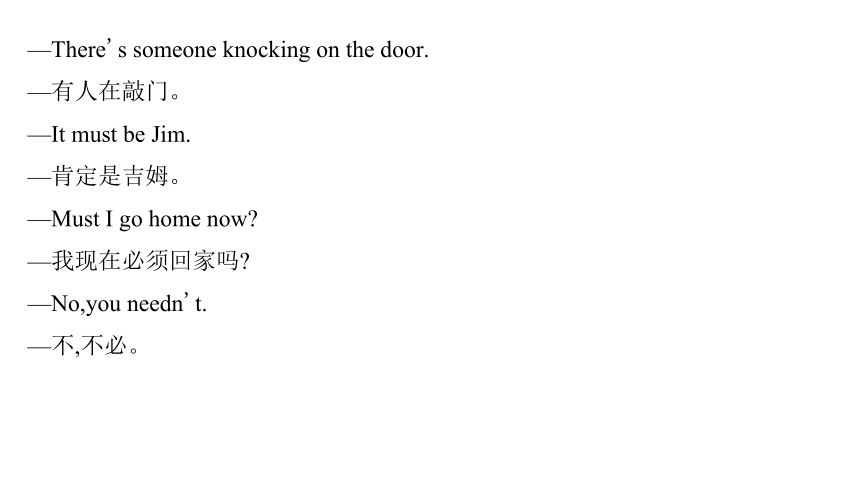
文档简介
(共20张PPT)
情态动词
一、情态动词的类型
1.只作情态动词的有:must,can/could,may/might
2.既可作情态动词也可作实义动词的有:need
3.既可作情态动词也可作助动词的有:will/would,shall/should
4.具有情态动词某些特征的有:have to,had better,used to,be able to
二、情态动词的特征
1.有一定的词义,但不能单独作谓语,必须和行为动词或系动词连用构成谓语。
2.无人称和数的变化(have to例外,主语为第三人称单数时用has to)。如:
We must stay here.我们必须待在这里。
He has to walk home.他不得不步行回家。
3.后接动词原形。如:
He can speak Japanese.
他会说日语。
4.具有助动词的作用,可用来构成否定句、疑问句及简明答语。如:
—Can we go home now,please
——现在我们可以回家了吗
—No,you can't.
——不,不可以。
三、情态动词的用法
(一)can和could的用法
1.表示能力,意为“能,会”。如:
Can you play basketball
你会打篮球吗
2.表示推测时,常用于否定句和疑问句中。如:
It can't be Nick's.它不可能是尼克的。
3.表示请求或允许,多用于口语中,意为“可以”,相当于may。如:
You can/may go now.你现在可以走了。
注意:以can开头的一般疑问句,其肯定回答和否定回答分别用can和can't。
4.could是can的过去式,表示过去的能力;could也可在疑问句中表示委婉地提出
请求。如:
I could sing English songs when I was four years old.
我四岁的时候就会唱英文歌曲。
(二)may的用法
1.表示推测,意为“可能;也许”,用于肯定句中。如:
He may come tomorrow.他明天可能会来。
2.表示请求、许可,意为“可以”。如:
May I come in 我可以进来吗
注意:may表请求,用于主语为第一人称的一般疑问句时,其否定回答用mustn't
或can't,不用may not。
3.表示祝愿。如:
May you succeed!祝你成功!
注意:can和may均可用来表示征求意见或请求许可,意为“可以”,一般可互换使用。
(三)must的用法
1.表示说话人的主观语气,意为“必须”。
2.表示推测,意为“一定”,一般用于肯定句。
在疑问句和否定句中表推测时一般应用can,否定句中也用may,但may not表示“可能不”,而can't 表示“不可能”。
在否定句中,mustn't表示“禁止”,意为“千万不要”。
以must开头的疑问句,肯定回答应用must;而否定回答则常用needn't,意为“不需要,不必”,相当于don't have to,而不能用mustn't。
must表示肯定的推测。
结构 作用
must be +表语 对现在状况的推测
must be +现在分词 对正在发生的事情的推测
must have+过去分词 对过去状况的推测
拓展:must,should,may 和 might都可表示推测,可能性从大到小依次为:must>should>may>might。
—There's someone knocking on the door.
—有人在敲门。
—It must be Jim.
—肯定是吉姆。
—Must I go home now
—我现在必须回家吗
—No,you needn't.
—不,不必。
(四)对need词性的判断
need后加to do说明need为实义动词,用助动词提问或否定;
若need后加动词原形,则need为情态动词,用need提问或否定。如:
You needn't come to school so early.
你不必这么早来学校。
You don't need to leave now.
你不必现在就走。
(五)had better的用法
had better do sth.表示“最好做某事”,否定式用:had better not do sth.。如:
You'd better stay at home.你最好待在家里。
(六)shall/should和will/would的用法
1.shall用于第一人称,表示征求意见、询问。如:
Shall I open the window 要我开窗吗
Shall we say 6 o'clock,then
那么,我们就定在6点钟好吗
2.should常用来表示义务、责任。如:
We should obey the traffic rules.
我们应该遵守交通规则。
3.will 用于第二人称,表示询问、请求,也可以表达现在的意愿。如:
Will you pass me that book 你能把那本书递给我吗
4.would 用来表示客气地请求别人做某事。如:
Would you tell me the way to the station
你能告诉我去车站的路吗
四、几组情态动词的辨析
1.can/could和be able to的区别
词语 用法 例句
can/could 只用于一般现在时(can)和一般过去时(could) Jim couldn't speak Chinese last year,but now he
can.
吉姆去年不会说汉语,但现在他会了。
be able to 可用于多种时态 We will be able to come back next week.我们下
周能回来。
2.can 和may表可能的区别
(1)在肯定句中,用may表示可能。如:
You had better ask that policeman.He may know.
你最好问那个警察,他可能知道。
(2)在否定句中,cannot/can't和may not的区别。
词语 用法 例句
cannot/can't 语气肯定,意为“不可能” Mr Li can‘t be in the room.He has gone to Beijing.李先生不可能在房间里,他去北京了。
may not 语气不肯定,意为“可能不” —Is John coming by train ——约翰是坐火车来吗
—He may not.He likes driving his car.——可能不是。他喜欢开他的小汽车。
3.must和have/has to的区别
4.can't和mustn't的区别
词语 用法 例句
must 表示主观意愿,意为“必须” We must study hard at school.在学校我们必须
努力学习。
have/has to 用于强调客观需要,意为“必须,不得不” We'll have to ask Zhang Hong.我们得去问张红。
词语 用法 例句
can't 表示否定推测,意为“不可能” He can't be Jim.他不可能是吉姆。
mustn't 表示“禁止、不允许”,不能用来表推测 You mustn't play soccer in the street.你千万别在街上踢足球。
1. — ________ you pass me a pen I’d like to write down the phone
number.
—Sure. Here it is.
A. Can B. Need C. Might
2.—May I go to the cinema, Mum
— Certainly, but you ________ be back by 11 o'clock.
A. can B. may C. must
3.You ________worry about me. It's nothing serious.
A. can‘t B. mustn’t C. needn't
A
C
C
4.—I called you yesterday.A woman answered, but I didn't recognize her voice.
—Oh,it ________ my aunt Jean.
A.must be B.must have been C.might be
5.—Excuse me. Is this the right way to the Summer Palace
—Sorry, I’m not sure . But it _______ be.
A. might B.mustn’t C.must
6. —Can you go skating with us this afternoon?
—Sorry,I can't. I ________ take care of my little sister at home.
A. can B. may C. have to
A
A
C
7.—_______I have your English name, please?
—Yes, Helen. H-E-L-E-N.
A. Must B. May C. Will
8. —Must we clean the room right now?
— No,you ________. You ________clean it after lunch.
A. needn't;may B. needn't;must C. mustn't;can
9.—You must come back every month.
—Yes, I ________.
A. will B. must C. should
B
A
A
10. Children ________ play with fire.
A. mustn't B. can't C. shouldn't
11.--Is Mr. Smith swimming in the pool, Harry
---It ______ be him. I saw him go to the library just now.
A. may not B. can’t C. needn’t
12. —Can I borrow your dictionary
—Yes, you _______.
A. can B. must C. should
A
B
A
13.— Finally, they came back.
— They ______be hungry after such a long walk.
A.can’t B.must C.needn’t
14.—Mum, I’m going climbing. Must I clean the room now
—No, you_____________. You can do it this evening.
A. can’t B. mustn’t C. needn’t
B
C
15. The passengers ______ show their ID cards before getting on the plane.
A. might B. must C. could
16.--Mum, ______ I visit the Science Museum tomorrow
--I'm afraid you can't. It is closed on Monday.
A. must B. may C. should
B
B
情态动词
一、情态动词的类型
1.只作情态动词的有:must,can/could,may/might
2.既可作情态动词也可作实义动词的有:need
3.既可作情态动词也可作助动词的有:will/would,shall/should
4.具有情态动词某些特征的有:have to,had better,used to,be able to
二、情态动词的特征
1.有一定的词义,但不能单独作谓语,必须和行为动词或系动词连用构成谓语。
2.无人称和数的变化(have to例外,主语为第三人称单数时用has to)。如:
We must stay here.我们必须待在这里。
He has to walk home.他不得不步行回家。
3.后接动词原形。如:
He can speak Japanese.
他会说日语。
4.具有助动词的作用,可用来构成否定句、疑问句及简明答语。如:
—Can we go home now,please
——现在我们可以回家了吗
—No,you can't.
——不,不可以。
三、情态动词的用法
(一)can和could的用法
1.表示能力,意为“能,会”。如:
Can you play basketball
你会打篮球吗
2.表示推测时,常用于否定句和疑问句中。如:
It can't be Nick's.它不可能是尼克的。
3.表示请求或允许,多用于口语中,意为“可以”,相当于may。如:
You can/may go now.你现在可以走了。
注意:以can开头的一般疑问句,其肯定回答和否定回答分别用can和can't。
4.could是can的过去式,表示过去的能力;could也可在疑问句中表示委婉地提出
请求。如:
I could sing English songs when I was four years old.
我四岁的时候就会唱英文歌曲。
(二)may的用法
1.表示推测,意为“可能;也许”,用于肯定句中。如:
He may come tomorrow.他明天可能会来。
2.表示请求、许可,意为“可以”。如:
May I come in 我可以进来吗
注意:may表请求,用于主语为第一人称的一般疑问句时,其否定回答用mustn't
或can't,不用may not。
3.表示祝愿。如:
May you succeed!祝你成功!
注意:can和may均可用来表示征求意见或请求许可,意为“可以”,一般可互换使用。
(三)must的用法
1.表示说话人的主观语气,意为“必须”。
2.表示推测,意为“一定”,一般用于肯定句。
在疑问句和否定句中表推测时一般应用can,否定句中也用may,但may not表示“可能不”,而can't 表示“不可能”。
在否定句中,mustn't表示“禁止”,意为“千万不要”。
以must开头的疑问句,肯定回答应用must;而否定回答则常用needn't,意为“不需要,不必”,相当于don't have to,而不能用mustn't。
must表示肯定的推测。
结构 作用
must be +表语 对现在状况的推测
must be +现在分词 对正在发生的事情的推测
must have+过去分词 对过去状况的推测
拓展:must,should,may 和 might都可表示推测,可能性从大到小依次为:must>should>may>might。
—There's someone knocking on the door.
—有人在敲门。
—It must be Jim.
—肯定是吉姆。
—Must I go home now
—我现在必须回家吗
—No,you needn't.
—不,不必。
(四)对need词性的判断
need后加to do说明need为实义动词,用助动词提问或否定;
若need后加动词原形,则need为情态动词,用need提问或否定。如:
You needn't come to school so early.
你不必这么早来学校。
You don't need to leave now.
你不必现在就走。
(五)had better的用法
had better do sth.表示“最好做某事”,否定式用:had better not do sth.。如:
You'd better stay at home.你最好待在家里。
(六)shall/should和will/would的用法
1.shall用于第一人称,表示征求意见、询问。如:
Shall I open the window 要我开窗吗
Shall we say 6 o'clock,then
那么,我们就定在6点钟好吗
2.should常用来表示义务、责任。如:
We should obey the traffic rules.
我们应该遵守交通规则。
3.will 用于第二人称,表示询问、请求,也可以表达现在的意愿。如:
Will you pass me that book 你能把那本书递给我吗
4.would 用来表示客气地请求别人做某事。如:
Would you tell me the way to the station
你能告诉我去车站的路吗
四、几组情态动词的辨析
1.can/could和be able to的区别
词语 用法 例句
can/could 只用于一般现在时(can)和一般过去时(could) Jim couldn't speak Chinese last year,but now he
can.
吉姆去年不会说汉语,但现在他会了。
be able to 可用于多种时态 We will be able to come back next week.我们下
周能回来。
2.can 和may表可能的区别
(1)在肯定句中,用may表示可能。如:
You had better ask that policeman.He may know.
你最好问那个警察,他可能知道。
(2)在否定句中,cannot/can't和may not的区别。
词语 用法 例句
cannot/can't 语气肯定,意为“不可能” Mr Li can‘t be in the room.He has gone to Beijing.李先生不可能在房间里,他去北京了。
may not 语气不肯定,意为“可能不” —Is John coming by train ——约翰是坐火车来吗
—He may not.He likes driving his car.——可能不是。他喜欢开他的小汽车。
3.must和have/has to的区别
4.can't和mustn't的区别
词语 用法 例句
must 表示主观意愿,意为“必须” We must study hard at school.在学校我们必须
努力学习。
have/has to 用于强调客观需要,意为“必须,不得不” We'll have to ask Zhang Hong.我们得去问张红。
词语 用法 例句
can't 表示否定推测,意为“不可能” He can't be Jim.他不可能是吉姆。
mustn't 表示“禁止、不允许”,不能用来表推测 You mustn't play soccer in the street.你千万别在街上踢足球。
1. — ________ you pass me a pen I’d like to write down the phone
number.
—Sure. Here it is.
A. Can B. Need C. Might
2.—May I go to the cinema, Mum
— Certainly, but you ________ be back by 11 o'clock.
A. can B. may C. must
3.You ________worry about me. It's nothing serious.
A. can‘t B. mustn’t C. needn't
A
C
C
4.—I called you yesterday.A woman answered, but I didn't recognize her voice.
—Oh,it ________ my aunt Jean.
A.must be B.must have been C.might be
5.—Excuse me. Is this the right way to the Summer Palace
—Sorry, I’m not sure . But it _______ be.
A. might B.mustn’t C.must
6. —Can you go skating with us this afternoon?
—Sorry,I can't. I ________ take care of my little sister at home.
A. can B. may C. have to
A
A
C
7.—_______I have your English name, please?
—Yes, Helen. H-E-L-E-N.
A. Must B. May C. Will
8. —Must we clean the room right now?
— No,you ________. You ________clean it after lunch.
A. needn't;may B. needn't;must C. mustn't;can
9.—You must come back every month.
—Yes, I ________.
A. will B. must C. should
B
A
A
10. Children ________ play with fire.
A. mustn't B. can't C. shouldn't
11.--Is Mr. Smith swimming in the pool, Harry
---It ______ be him. I saw him go to the library just now.
A. may not B. can’t C. needn’t
12. —Can I borrow your dictionary
—Yes, you _______.
A. can B. must C. should
A
B
A
13.— Finally, they came back.
— They ______be hungry after such a long walk.
A.can’t B.must C.needn’t
14.—Mum, I’m going climbing. Must I clean the room now
—No, you_____________. You can do it this evening.
A. can’t B. mustn’t C. needn’t
B
C
15. The passengers ______ show their ID cards before getting on the plane.
A. might B. must C. could
16.--Mum, ______ I visit the Science Museum tomorrow
--I'm afraid you can't. It is closed on Monday.
A. must B. may C. should
B
B
同课章节目录
- 词法
- 名词
- 动词和动词短语
- 动词语态
- 动词时态
- 助动词和情态动词
- 非谓语动词
- 冠词
- 代词
- 数词和量词
- 形容词副词及其比较等级
- 介词和介词短语
- 连词和感叹词
- 构词法
- 相似、相近词比较
- 句法
- 陈述句
- 一般疑问句和否定疑问句
- 特殊疑问句及选择疑问句
- 反意疑问句
- 存在句(There be句型)
- 宾语从句
- 定语从句
- 状语从句
- 主谓一致问题
- 简单句
- 并列句
- 复合句
- 主谓一致
- 主、表语从句
- 名词性从句
- 直接引语和间接引语
- 虚拟语气
- 感叹句
- 强调句
- 倒装句
- 祈使句
- 句子的成分
- 句子的分类
- 题型专区
- 单项选择部分
- 易错题
- 完形填空
- 阅读理解
- 词汇练习
- 听说训练
- 句型转换
- 补全对话
- 短文改错
- 翻译
- 书面表达
- 任务型阅读
- 语法填空
- 其他资料
